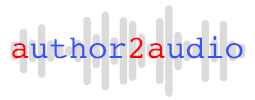David Stokes, founder of Author2Audio, answers some common questions from authors interested in turning their title into an audiobook.
When on ‘discovery calls’ with prospective authors, I invariably ask my routine question: ‘Why do you want an audiobook?’
This is often followed by an uncomfortable pause on the other end of the line … maybe the silence is explained by the fact that I have trumped the author’s question? Whatever the reason, 90% of the time the author’s responses are the same: ‘My readers have asked me when the audio version of my book is going to be available.’
Now, doesn’t every author want to hear that? Listening to the needs of your target audience is the crucial behaviour for successful independent publication. Successful audiobook authors are no different to other thriving authors. In my opinion, the combination of great quality content, an engaged community and astute use of media (traditional and social), will help all your book formats flourish.
‘If my readers want an audiobook, should I make one for them?’
I often answer: ‘Yes, and but …’
- Audiobook sales growth has been substantially outstripping print and ebooks for a number of years now, but you’ll probably need three to five years to recoup your audiobook investment. Beyond that, it’s pure perpetual profit
- Offering another format can give your readers a new and unique experience of your writing, but audiobook sales are still ‘small scale’ compared to print and ebook volumes
- You are likely to find brand new audiences. Anecdotally, 70% of the rapid demand growth for audio, identify as male (who would have NEVER bought your paperback), but they may be a little more challenging to find and market to, particularly on social media
- Being able to listen to audio, whilst walking, cycling and gardening in a time poor world is clearly an advantage
- By age, by design or by accident, our vision (or hearing) may make reading more challenging—audiobooks can be a great substitute, but the latest digital delivery technologies are not necessarily easy for those listeners to master.
‘All of these are great suggestions and motivations Dave, but how do I decide on the “voice” of my audiobook?’
This decision for authors seems to depend on two related factors:
- The experience, quality, skill and authenticity of the author’s voice
- The genre of the content, but more importantly the extent of dialogue.
If the author has written a memoir, (auto) biography, business advice or self-help style book, then the expectation of listeners seem almost universal—it will be narrated by the author. On the other hand, if it is a work of fiction then a voice actor is worthy of consideration.
The voice an author chooses for their audiobook is a critical milestone—and as your instincts will tell you—is decided very early in the audiobook creation process.
There are many considerations (we will address these in detail for future articles), but essentially the following broad principles apply:
Nonfiction
If your story is about you and your life experiences, then the author’s voice is inextricably tied to the storytelling of those events. You, and you alone, will be able to credibly convey the sentiments, discoveries and learnings from your journey. This premise often falls under the banners of thought leadership, historical research, knowledge sharing, and personal (and business) branding.
Chances are, your audiobook buying audience have already heard you speak in public, at workshops or across various forms of media.
Please click the link to hear an audiobook sample from our audiobook author and narrator Tim Wood:
Fiction
For a novel, the choice of narrator is equally clear cut (although I do often suggest the author’s voice is heard in the foreword, dedication or afterword—the ‘fly on the wall’ factor).
The choice of narrator almost completely depends on being able to match the ‘character voices in your head’ with a voice artist.
Over the seven-year history of author2audio, I have compiled a narrator roster—an enormously varied list of voice artists where you can listen to a brief audio ‘show reel’ demonstrating their skill.
You may know some of them from TV, radio or even your iPhone. But if you want Matt Damon, you’ll need a budget in the vicinity of USD $10,000 per hour!
The process of choosing a voice, is made much easier by supplying the artist with an ‘audition piece’, usually including:
- The story outline
- Major character profiles
- Both descriptive and ‘dialogue heavy’ excerpts from your book
Be kind and ask for no more than 10 minutes—auditions are usually done at the narrator’s cost.
In this link, we have a sample from George Paxinos’s novel, narrated by voice artist and TV presenter Emma Grant Williams:
‘Righto Dave … what’s the damage, and what do you mean by ‘studio free’?’
I charge a fee of $500 (ex GST) per 10,000 words to create (consult, edit, produce and publish) the audiobook of your title.
A typical ‘business book’ (40,000 words) will cost around $2,200 including GST, and will be digitally published at 20+ online retailers including: Amazon/Audible, Apple Books, Google Play, and Spotify. The audiobook will be around five hours long.
The entire process takes six to eight weeks, and the author retains all royalty and ownership rights.
With only a few tiny exceptions, the author will record in the comfort and convenience of their home office into a $200 USB, studio quality microphone, recording directly to their laptop. That’s studio free!
Both the microphone and voice artist are extras. Add $150 to $200 per hour for your narrator’s fee. This will take your final cost to market to around $3,500 including GST.
David Stokes is an audiobook expert and the founder of Melbourne-based Author2Audio audiobook service. For more information about turning your book into an audiobook, visit him at his website or send him an email.



Comments are closed.